Investigation Report: Qualitative Research in Healthcare (PUBH6013)
VerifiedAdded on 2022/09/24
|10
|2280
|20
Report
AI Summary
This report presents a qualitative research study conducted in the healthcare sector, focusing on the perspectives of various stakeholders, including administrative staff, nurses, physicians, and management. The study employed interviews, focus groups, and observations to gather primary data, guided by an interpretivist research philosophy. The report highlights ethical and cultural considerations, ensuring informed consent, avoiding plagiarism, and acknowledging multicultural aspects. The analysis reveals the vital roles of support functions in healthcare, emphasizing their contribution to effective service delivery and patient care. Findings are presented through coded categories, illustrating the importance of collaboration and acknowledging the contributions of support staff. The reflection section discusses the challenges and rewards of the research process, emphasizing the need for improved time management in future studies.
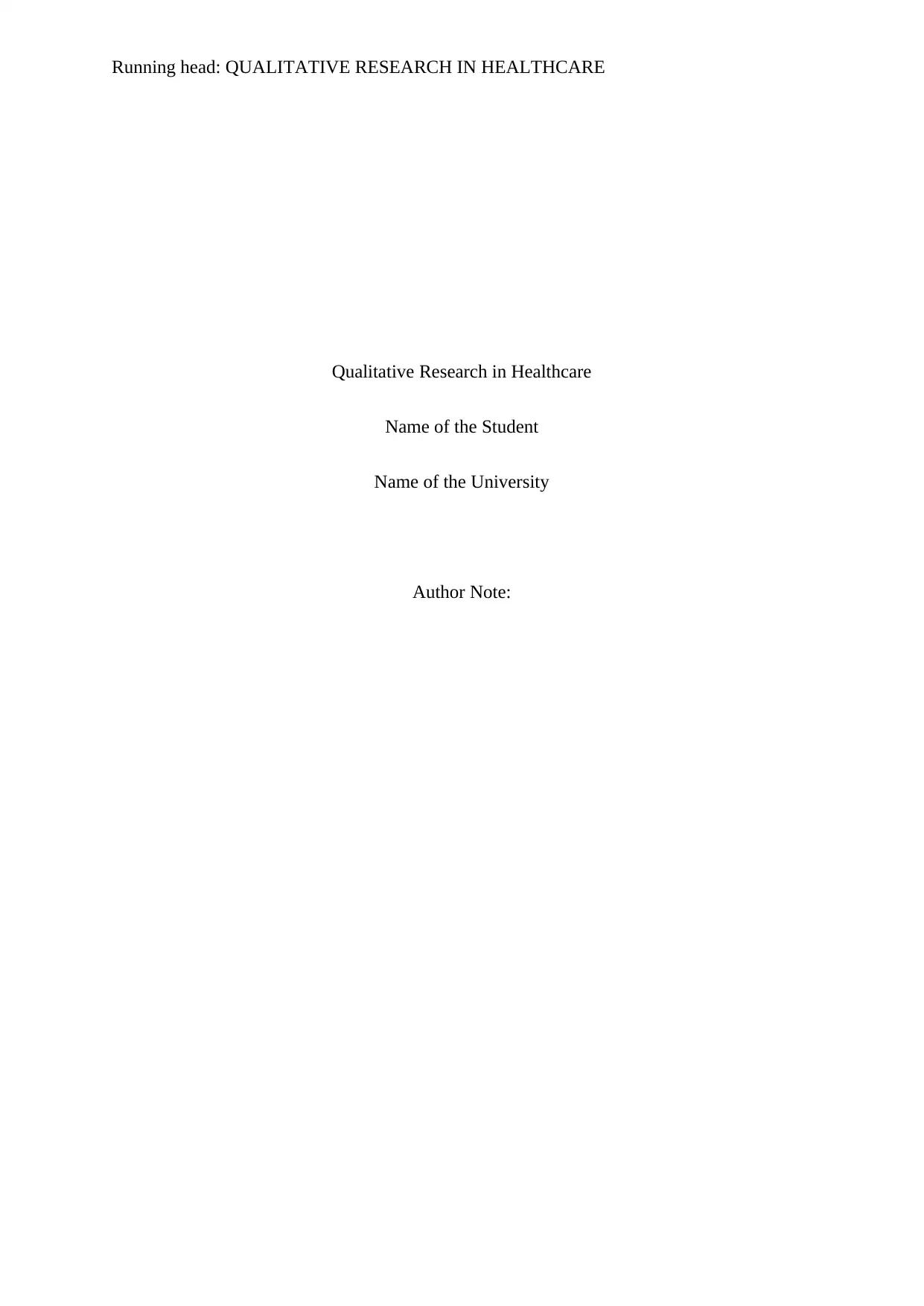
Running head: QUALITATIVE RESEARCH IN HEALTHCARE
Qualitative Research in Healthcare
Name of the Student
Name of the University
Author Note:
Qualitative Research in Healthcare
Name of the Student
Name of the University
Author Note:
Paraphrase This Document
Need a fresh take? Get an instant paraphrase of this document with our AI Paraphraser
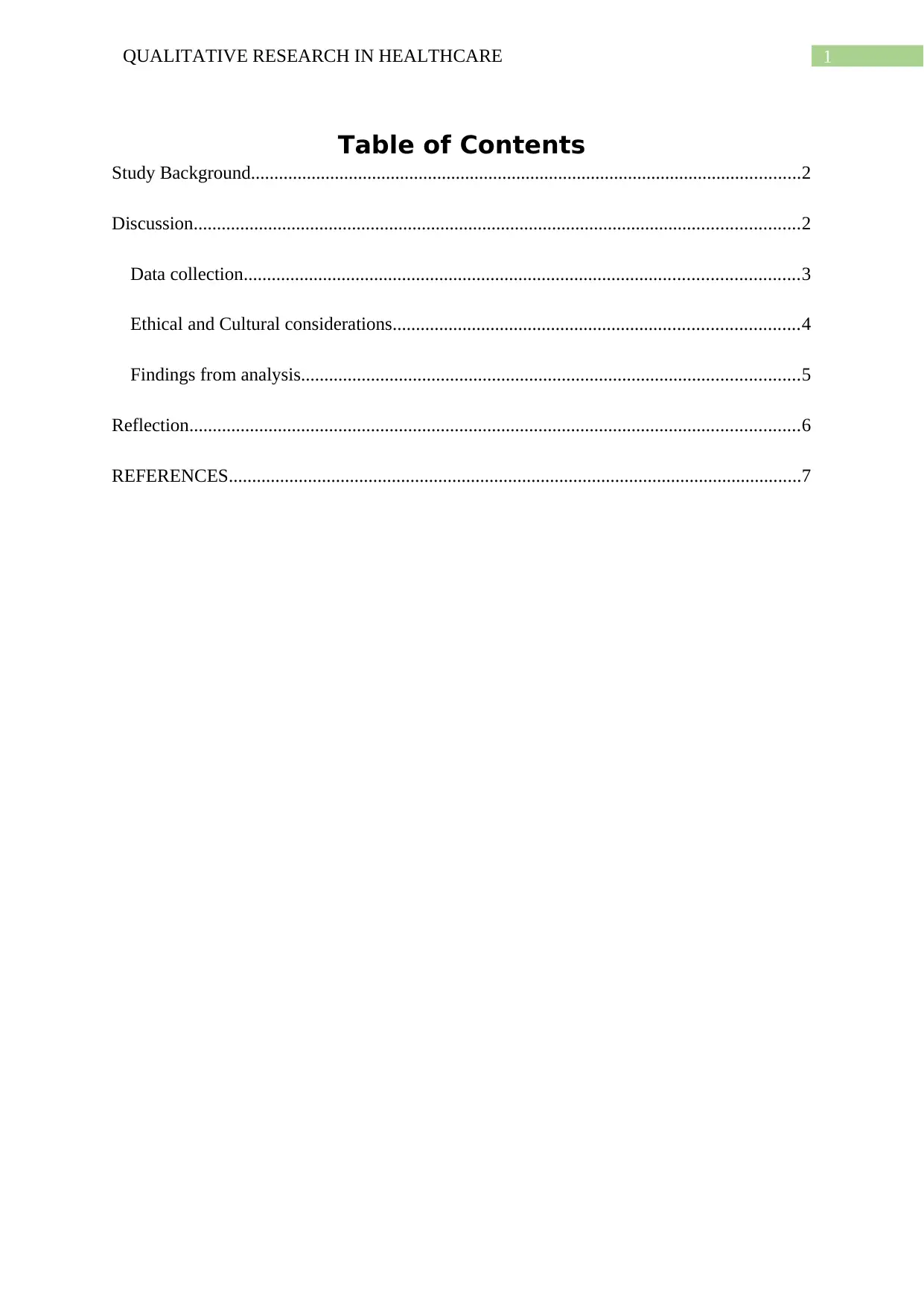
1QUALITATIVE RESEARCH IN HEALTHCARE
Table of Contents
Study Background......................................................................................................................2
Discussion..................................................................................................................................2
Data collection.......................................................................................................................3
Ethical and Cultural considerations.......................................................................................4
Findings from analysis...........................................................................................................5
Reflection...................................................................................................................................6
REFERENCES...........................................................................................................................7
Table of Contents
Study Background......................................................................................................................2
Discussion..................................................................................................................................2
Data collection.......................................................................................................................3
Ethical and Cultural considerations.......................................................................................4
Findings from analysis...........................................................................................................5
Reflection...................................................................................................................................6
REFERENCES...........................................................................................................................7
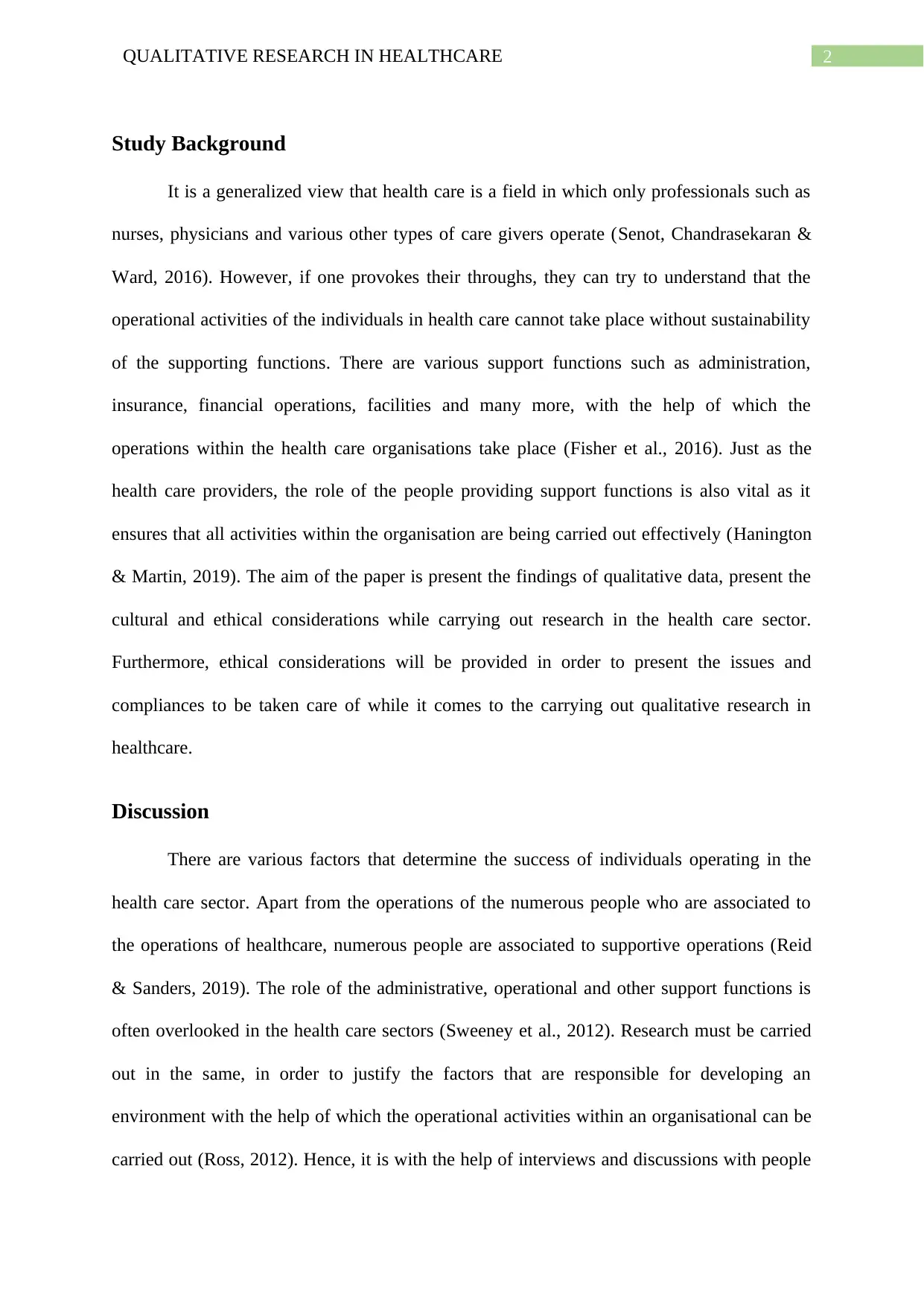
2QUALITATIVE RESEARCH IN HEALTHCARE
Study Background
It is a generalized view that health care is a field in which only professionals such as
nurses, physicians and various other types of care givers operate (Senot, Chandrasekaran &
Ward, 2016). However, if one provokes their throughs, they can try to understand that the
operational activities of the individuals in health care cannot take place without sustainability
of the supporting functions. There are various support functions such as administration,
insurance, financial operations, facilities and many more, with the help of which the
operations within the health care organisations take place (Fisher et al., 2016). Just as the
health care providers, the role of the people providing support functions is also vital as it
ensures that all activities within the organisation are being carried out effectively (Hanington
& Martin, 2019). The aim of the paper is present the findings of qualitative data, present the
cultural and ethical considerations while carrying out research in the health care sector.
Furthermore, ethical considerations will be provided in order to present the issues and
compliances to be taken care of while it comes to the carrying out qualitative research in
healthcare.
Discussion
There are various factors that determine the success of individuals operating in the
health care sector. Apart from the operations of the numerous people who are associated to
the operations of healthcare, numerous people are associated to supportive operations (Reid
& Sanders, 2019). The role of the administrative, operational and other support functions is
often overlooked in the health care sectors (Sweeney et al., 2012). Research must be carried
out in the same, in order to justify the factors that are responsible for developing an
environment with the help of which the operational activities within an organisational can be
carried out (Ross, 2012). Hence, it is with the help of interviews and discussions with people
Study Background
It is a generalized view that health care is a field in which only professionals such as
nurses, physicians and various other types of care givers operate (Senot, Chandrasekaran &
Ward, 2016). However, if one provokes their throughs, they can try to understand that the
operational activities of the individuals in health care cannot take place without sustainability
of the supporting functions. There are various support functions such as administration,
insurance, financial operations, facilities and many more, with the help of which the
operations within the health care organisations take place (Fisher et al., 2016). Just as the
health care providers, the role of the people providing support functions is also vital as it
ensures that all activities within the organisation are being carried out effectively (Hanington
& Martin, 2019). The aim of the paper is present the findings of qualitative data, present the
cultural and ethical considerations while carrying out research in the health care sector.
Furthermore, ethical considerations will be provided in order to present the issues and
compliances to be taken care of while it comes to the carrying out qualitative research in
healthcare.
Discussion
There are various factors that determine the success of individuals operating in the
health care sector. Apart from the operations of the numerous people who are associated to
the operations of healthcare, numerous people are associated to supportive operations (Reid
& Sanders, 2019). The role of the administrative, operational and other support functions is
often overlooked in the health care sectors (Sweeney et al., 2012). Research must be carried
out in the same, in order to justify the factors that are responsible for developing an
environment with the help of which the operational activities within an organisational can be
carried out (Ross, 2012). Hence, it is with the help of interviews and discussions with people
⊘ This is a preview!⊘
Do you want full access?
Subscribe today to unlock all pages.

Trusted by 1+ million students worldwide
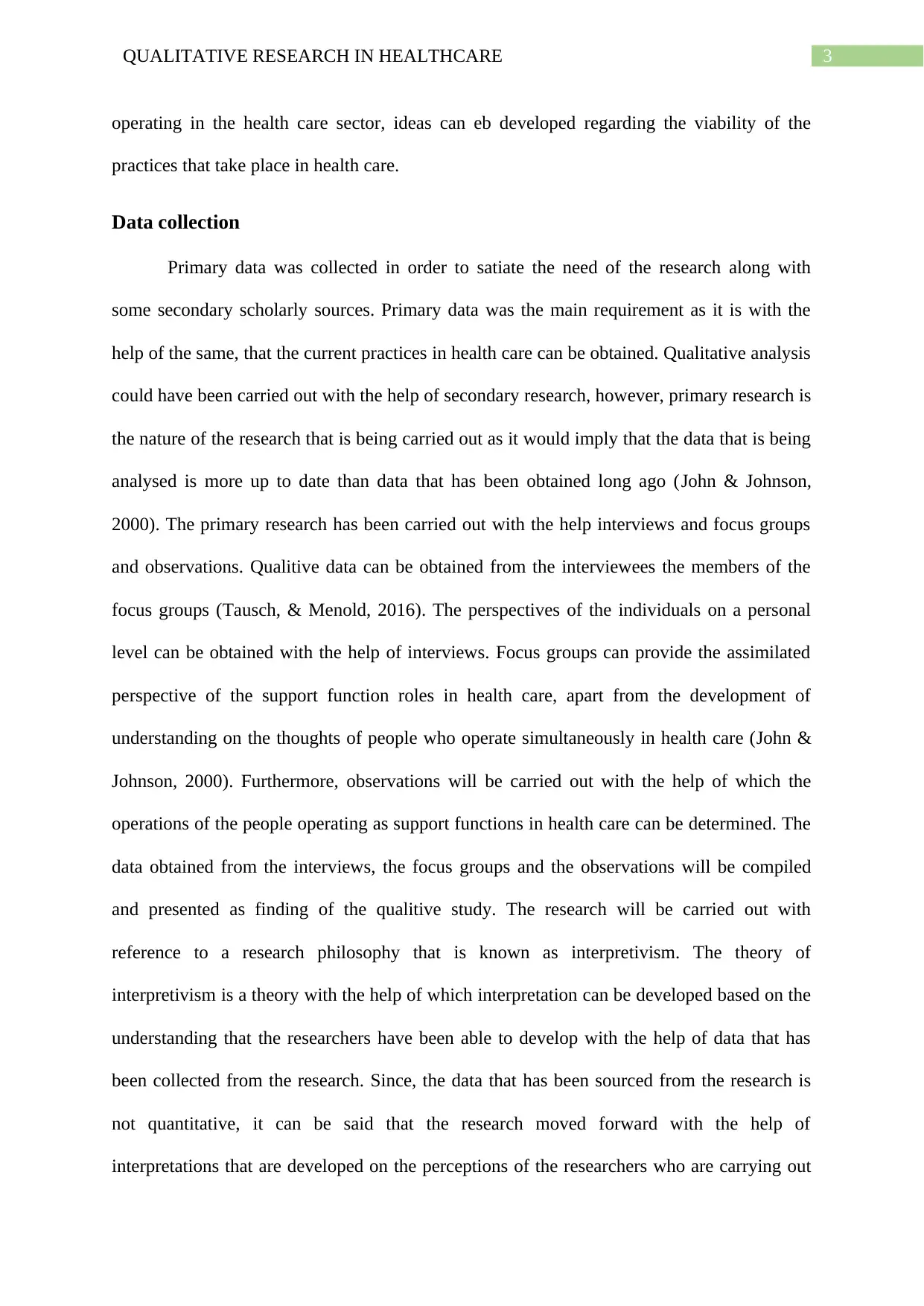
3QUALITATIVE RESEARCH IN HEALTHCARE
operating in the health care sector, ideas can eb developed regarding the viability of the
practices that take place in health care.
Data collection
Primary data was collected in order to satiate the need of the research along with
some secondary scholarly sources. Primary data was the main requirement as it is with the
help of the same, that the current practices in health care can be obtained. Qualitative analysis
could have been carried out with the help of secondary research, however, primary research is
the nature of the research that is being carried out as it would imply that the data that is being
analysed is more up to date than data that has been obtained long ago (John & Johnson,
2000). The primary research has been carried out with the help interviews and focus groups
and observations. Qualitive data can be obtained from the interviewees the members of the
focus groups (Tausch, & Menold, 2016). The perspectives of the individuals on a personal
level can be obtained with the help of interviews. Focus groups can provide the assimilated
perspective of the support function roles in health care, apart from the development of
understanding on the thoughts of people who operate simultaneously in health care (John &
Johnson, 2000). Furthermore, observations will be carried out with the help of which the
operations of the people operating as support functions in health care can be determined. The
data obtained from the interviews, the focus groups and the observations will be compiled
and presented as finding of the qualitive study. The research will be carried out with
reference to a research philosophy that is known as interpretivism. The theory of
interpretivism is a theory with the help of which interpretation can be developed based on the
understanding that the researchers have been able to develop with the help of data that has
been collected from the research. Since, the data that has been sourced from the research is
not quantitative, it can be said that the research moved forward with the help of
interpretations that are developed on the perceptions of the researchers who are carrying out
operating in the health care sector, ideas can eb developed regarding the viability of the
practices that take place in health care.
Data collection
Primary data was collected in order to satiate the need of the research along with
some secondary scholarly sources. Primary data was the main requirement as it is with the
help of the same, that the current practices in health care can be obtained. Qualitative analysis
could have been carried out with the help of secondary research, however, primary research is
the nature of the research that is being carried out as it would imply that the data that is being
analysed is more up to date than data that has been obtained long ago (John & Johnson,
2000). The primary research has been carried out with the help interviews and focus groups
and observations. Qualitive data can be obtained from the interviewees the members of the
focus groups (Tausch, & Menold, 2016). The perspectives of the individuals on a personal
level can be obtained with the help of interviews. Focus groups can provide the assimilated
perspective of the support function roles in health care, apart from the development of
understanding on the thoughts of people who operate simultaneously in health care (John &
Johnson, 2000). Furthermore, observations will be carried out with the help of which the
operations of the people operating as support functions in health care can be determined. The
data obtained from the interviews, the focus groups and the observations will be compiled
and presented as finding of the qualitive study. The research will be carried out with
reference to a research philosophy that is known as interpretivism. The theory of
interpretivism is a theory with the help of which interpretation can be developed based on the
understanding that the researchers have been able to develop with the help of data that has
been collected from the research. Since, the data that has been sourced from the research is
not quantitative, it can be said that the research moved forward with the help of
interpretations that are developed on the perceptions of the researchers who are carrying out
Paraphrase This Document
Need a fresh take? Get an instant paraphrase of this document with our AI Paraphraser
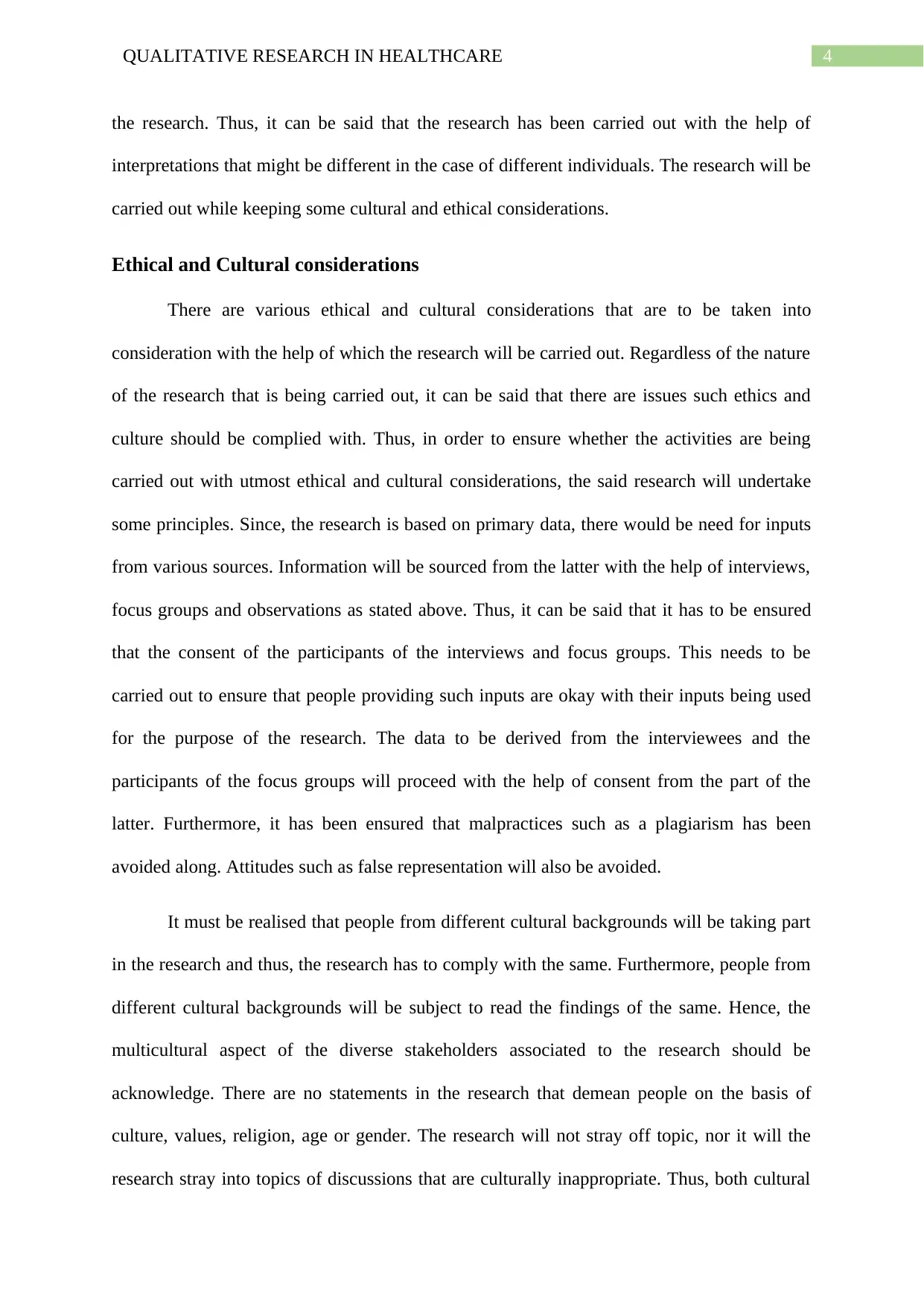
4QUALITATIVE RESEARCH IN HEALTHCARE
the research. Thus, it can be said that the research has been carried out with the help of
interpretations that might be different in the case of different individuals. The research will be
carried out while keeping some cultural and ethical considerations.
Ethical and Cultural considerations
There are various ethical and cultural considerations that are to be taken into
consideration with the help of which the research will be carried out. Regardless of the nature
of the research that is being carried out, it can be said that there are issues such ethics and
culture should be complied with. Thus, in order to ensure whether the activities are being
carried out with utmost ethical and cultural considerations, the said research will undertake
some principles. Since, the research is based on primary data, there would be need for inputs
from various sources. Information will be sourced from the latter with the help of interviews,
focus groups and observations as stated above. Thus, it can be said that it has to be ensured
that the consent of the participants of the interviews and focus groups. This needs to be
carried out to ensure that people providing such inputs are okay with their inputs being used
for the purpose of the research. The data to be derived from the interviewees and the
participants of the focus groups will proceed with the help of consent from the part of the
latter. Furthermore, it has been ensured that malpractices such as a plagiarism has been
avoided along. Attitudes such as false representation will also be avoided.
It must be realised that people from different cultural backgrounds will be taking part
in the research and thus, the research has to comply with the same. Furthermore, people from
different cultural backgrounds will be subject to read the findings of the same. Hence, the
multicultural aspect of the diverse stakeholders associated to the research should be
acknowledge. There are no statements in the research that demean people on the basis of
culture, values, religion, age or gender. The research will not stray off topic, nor it will the
research stray into topics of discussions that are culturally inappropriate. Thus, both cultural
the research. Thus, it can be said that the research has been carried out with the help of
interpretations that might be different in the case of different individuals. The research will be
carried out while keeping some cultural and ethical considerations.
Ethical and Cultural considerations
There are various ethical and cultural considerations that are to be taken into
consideration with the help of which the research will be carried out. Regardless of the nature
of the research that is being carried out, it can be said that there are issues such ethics and
culture should be complied with. Thus, in order to ensure whether the activities are being
carried out with utmost ethical and cultural considerations, the said research will undertake
some principles. Since, the research is based on primary data, there would be need for inputs
from various sources. Information will be sourced from the latter with the help of interviews,
focus groups and observations as stated above. Thus, it can be said that it has to be ensured
that the consent of the participants of the interviews and focus groups. This needs to be
carried out to ensure that people providing such inputs are okay with their inputs being used
for the purpose of the research. The data to be derived from the interviewees and the
participants of the focus groups will proceed with the help of consent from the part of the
latter. Furthermore, it has been ensured that malpractices such as a plagiarism has been
avoided along. Attitudes such as false representation will also be avoided.
It must be realised that people from different cultural backgrounds will be taking part
in the research and thus, the research has to comply with the same. Furthermore, people from
different cultural backgrounds will be subject to read the findings of the same. Hence, the
multicultural aspect of the diverse stakeholders associated to the research should be
acknowledge. There are no statements in the research that demean people on the basis of
culture, values, religion, age or gender. The research will not stray off topic, nor it will the
research stray into topics of discussions that are culturally inappropriate. Thus, both cultural
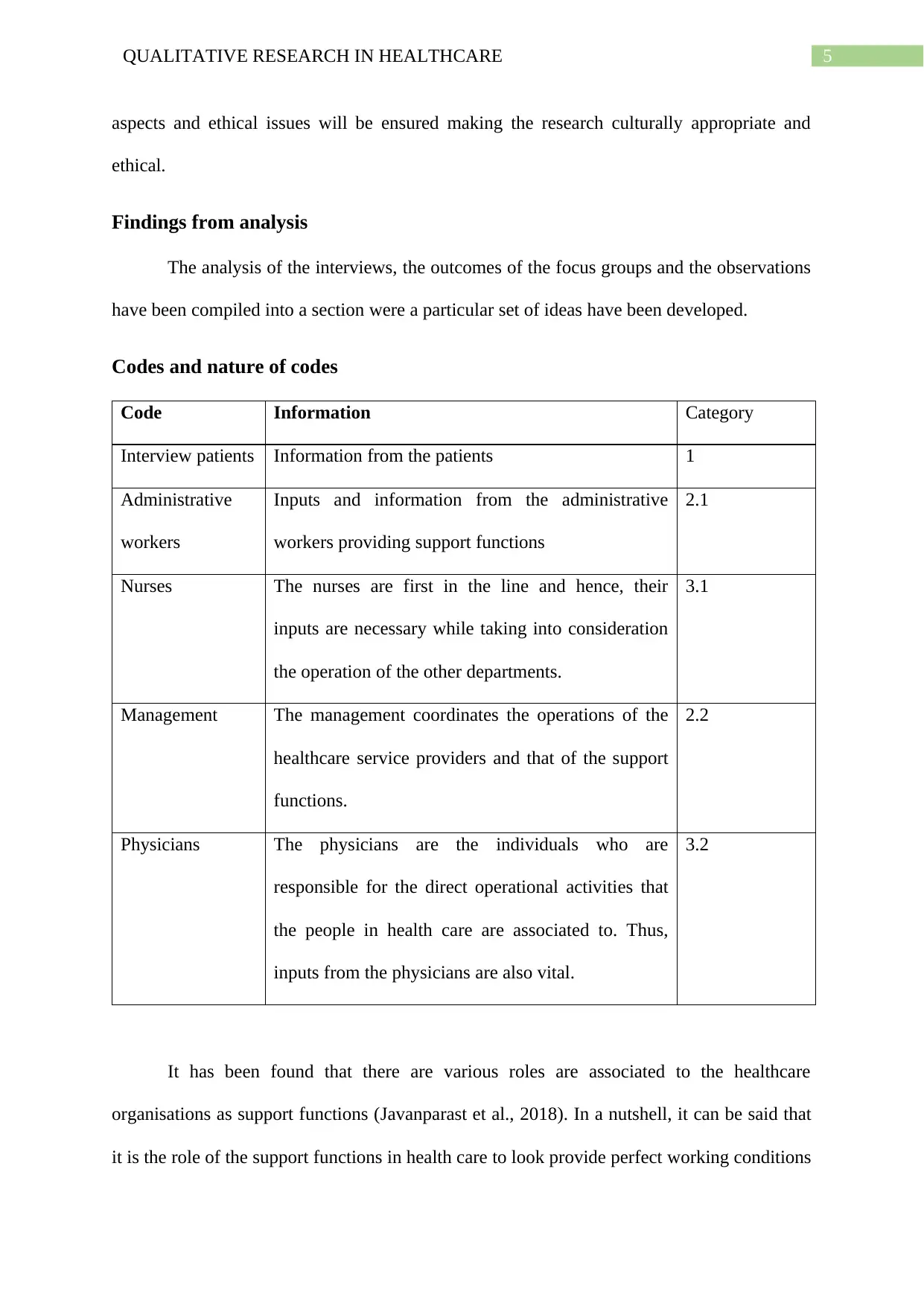
5QUALITATIVE RESEARCH IN HEALTHCARE
aspects and ethical issues will be ensured making the research culturally appropriate and
ethical.
Findings from analysis
The analysis of the interviews, the outcomes of the focus groups and the observations
have been compiled into a section were a particular set of ideas have been developed.
Codes and nature of codes
Code Information Category
Interview patients Information from the patients 1
Administrative
workers
Inputs and information from the administrative
workers providing support functions
2.1
Nurses The nurses are first in the line and hence, their
inputs are necessary while taking into consideration
the operation of the other departments.
3.1
Management The management coordinates the operations of the
healthcare service providers and that of the support
functions.
2.2
Physicians The physicians are the individuals who are
responsible for the direct operational activities that
the people in health care are associated to. Thus,
inputs from the physicians are also vital.
3.2
It has been found that there are various roles are associated to the healthcare
organisations as support functions (Javanparast et al., 2018). In a nutshell, it can be said that
it is the role of the support functions in health care to look provide perfect working conditions
aspects and ethical issues will be ensured making the research culturally appropriate and
ethical.
Findings from analysis
The analysis of the interviews, the outcomes of the focus groups and the observations
have been compiled into a section were a particular set of ideas have been developed.
Codes and nature of codes
Code Information Category
Interview patients Information from the patients 1
Administrative
workers
Inputs and information from the administrative
workers providing support functions
2.1
Nurses The nurses are first in the line and hence, their
inputs are necessary while taking into consideration
the operation of the other departments.
3.1
Management The management coordinates the operations of the
healthcare service providers and that of the support
functions.
2.2
Physicians The physicians are the individuals who are
responsible for the direct operational activities that
the people in health care are associated to. Thus,
inputs from the physicians are also vital.
3.2
It has been found that there are various roles are associated to the healthcare
organisations as support functions (Javanparast et al., 2018). In a nutshell, it can be said that
it is the role of the support functions in health care to look provide perfect working conditions
⊘ This is a preview!⊘
Do you want full access?
Subscribe today to unlock all pages.

Trusted by 1+ million students worldwide
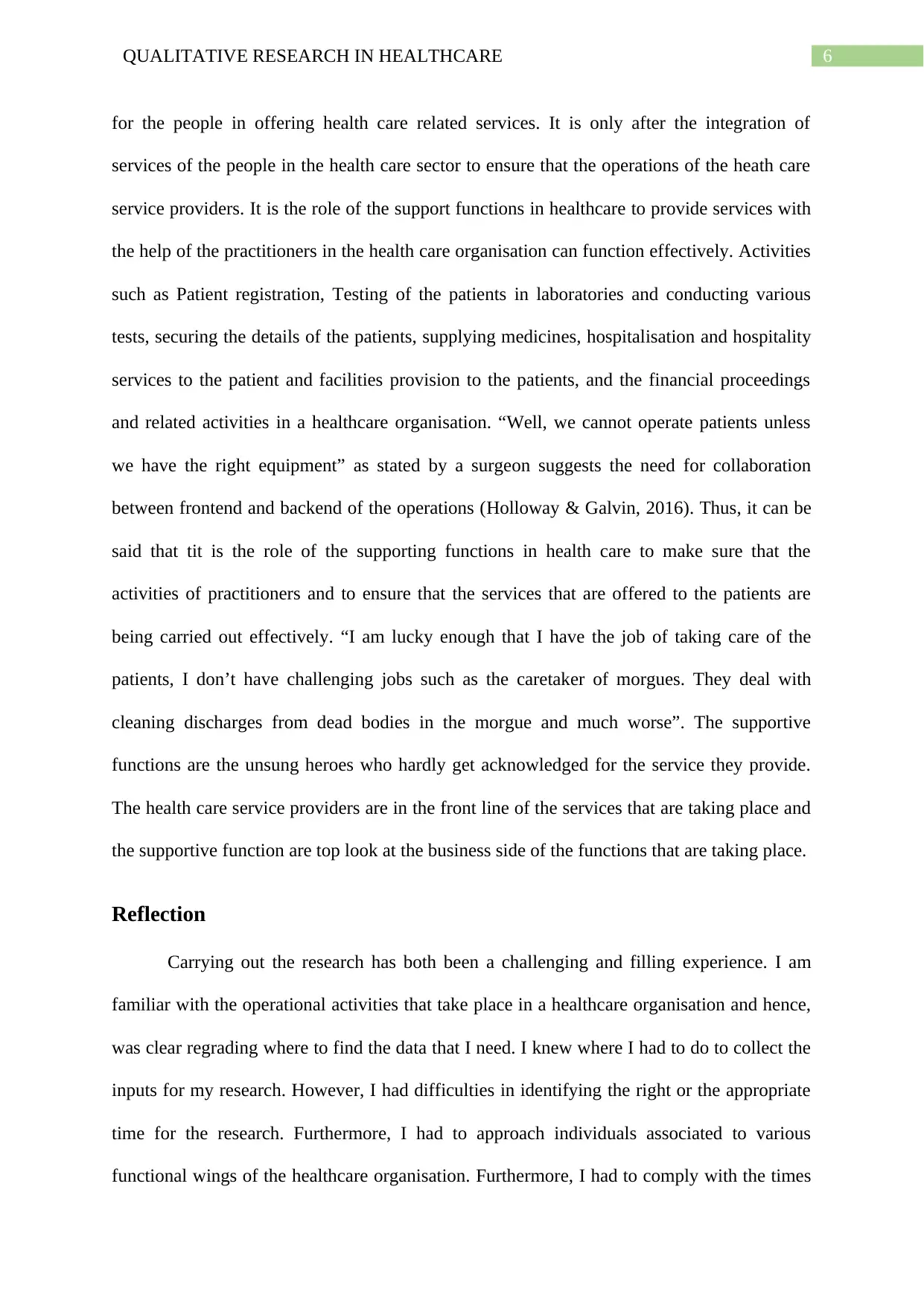
6QUALITATIVE RESEARCH IN HEALTHCARE
for the people in offering health care related services. It is only after the integration of
services of the people in the health care sector to ensure that the operations of the heath care
service providers. It is the role of the support functions in healthcare to provide services with
the help of the practitioners in the health care organisation can function effectively. Activities
such as Patient registration, Testing of the patients in laboratories and conducting various
tests, securing the details of the patients, supplying medicines, hospitalisation and hospitality
services to the patient and facilities provision to the patients, and the financial proceedings
and related activities in a healthcare organisation. “Well, we cannot operate patients unless
we have the right equipment” as stated by a surgeon suggests the need for collaboration
between frontend and backend of the operations (Holloway & Galvin, 2016). Thus, it can be
said that tit is the role of the supporting functions in health care to make sure that the
activities of practitioners and to ensure that the services that are offered to the patients are
being carried out effectively. “I am lucky enough that I have the job of taking care of the
patients, I don’t have challenging jobs such as the caretaker of morgues. They deal with
cleaning discharges from dead bodies in the morgue and much worse”. The supportive
functions are the unsung heroes who hardly get acknowledged for the service they provide.
The health care service providers are in the front line of the services that are taking place and
the supportive function are top look at the business side of the functions that are taking place.
Reflection
Carrying out the research has both been a challenging and filling experience. I am
familiar with the operational activities that take place in a healthcare organisation and hence,
was clear regrading where to find the data that I need. I knew where I had to do to collect the
inputs for my research. However, I had difficulties in identifying the right or the appropriate
time for the research. Furthermore, I had to approach individuals associated to various
functional wings of the healthcare organisation. Furthermore, I had to comply with the times
for the people in offering health care related services. It is only after the integration of
services of the people in the health care sector to ensure that the operations of the heath care
service providers. It is the role of the support functions in healthcare to provide services with
the help of the practitioners in the health care organisation can function effectively. Activities
such as Patient registration, Testing of the patients in laboratories and conducting various
tests, securing the details of the patients, supplying medicines, hospitalisation and hospitality
services to the patient and facilities provision to the patients, and the financial proceedings
and related activities in a healthcare organisation. “Well, we cannot operate patients unless
we have the right equipment” as stated by a surgeon suggests the need for collaboration
between frontend and backend of the operations (Holloway & Galvin, 2016). Thus, it can be
said that tit is the role of the supporting functions in health care to make sure that the
activities of practitioners and to ensure that the services that are offered to the patients are
being carried out effectively. “I am lucky enough that I have the job of taking care of the
patients, I don’t have challenging jobs such as the caretaker of morgues. They deal with
cleaning discharges from dead bodies in the morgue and much worse”. The supportive
functions are the unsung heroes who hardly get acknowledged for the service they provide.
The health care service providers are in the front line of the services that are taking place and
the supportive function are top look at the business side of the functions that are taking place.
Reflection
Carrying out the research has both been a challenging and filling experience. I am
familiar with the operational activities that take place in a healthcare organisation and hence,
was clear regrading where to find the data that I need. I knew where I had to do to collect the
inputs for my research. However, I had difficulties in identifying the right or the appropriate
time for the research. Furthermore, I had to approach individuals associated to various
functional wings of the healthcare organisation. Furthermore, I had to comply with the times
Paraphrase This Document
Need a fresh take? Get an instant paraphrase of this document with our AI Paraphraser
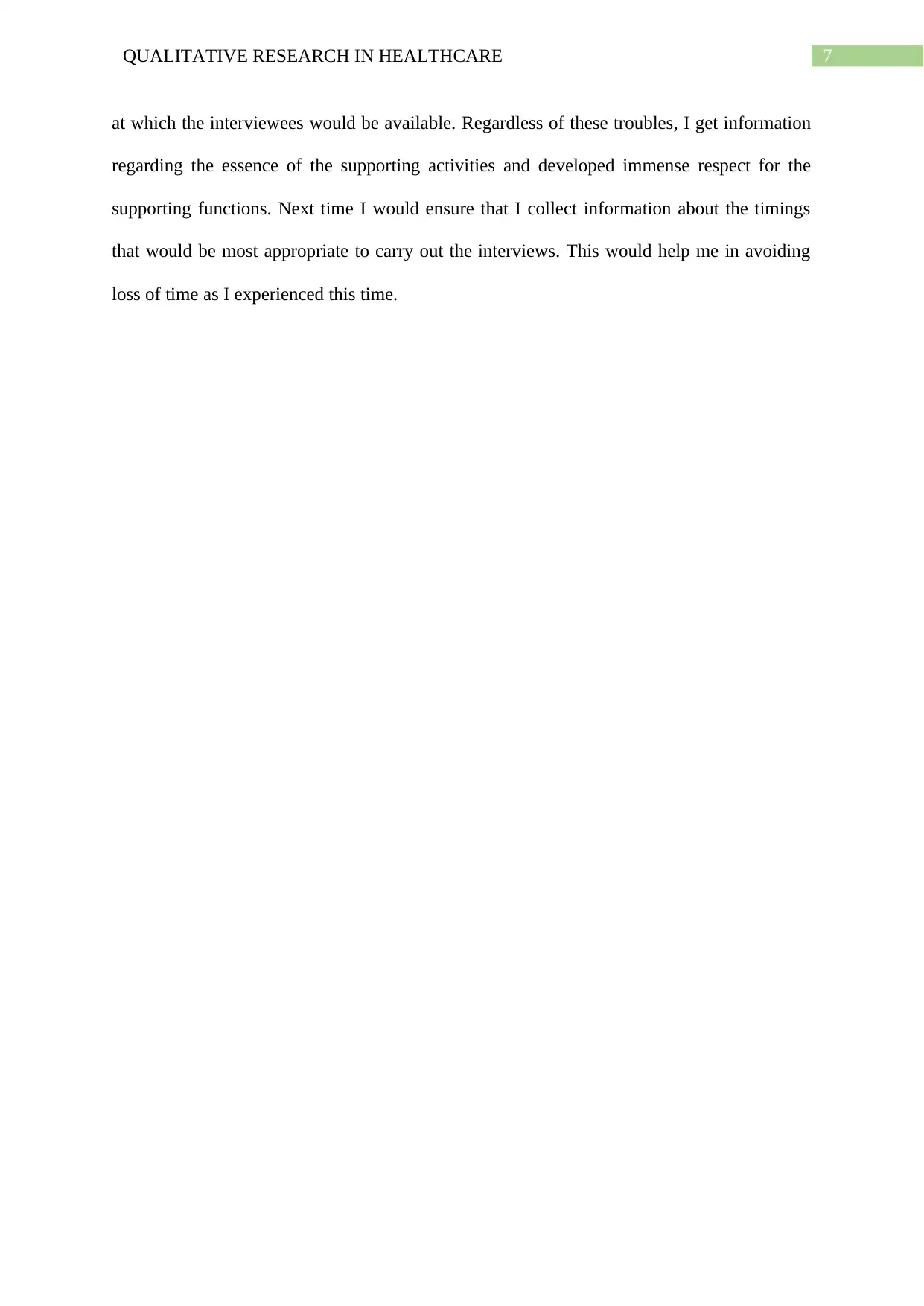
7QUALITATIVE RESEARCH IN HEALTHCARE
at which the interviewees would be available. Regardless of these troubles, I get information
regarding the essence of the supporting activities and developed immense respect for the
supporting functions. Next time I would ensure that I collect information about the timings
that would be most appropriate to carry out the interviews. This would help me in avoiding
loss of time as I experienced this time.
at which the interviewees would be available. Regardless of these troubles, I get information
regarding the essence of the supporting activities and developed immense respect for the
supporting functions. Next time I would ensure that I collect information about the timings
that would be most appropriate to carry out the interviews. This would help me in avoiding
loss of time as I experienced this time.
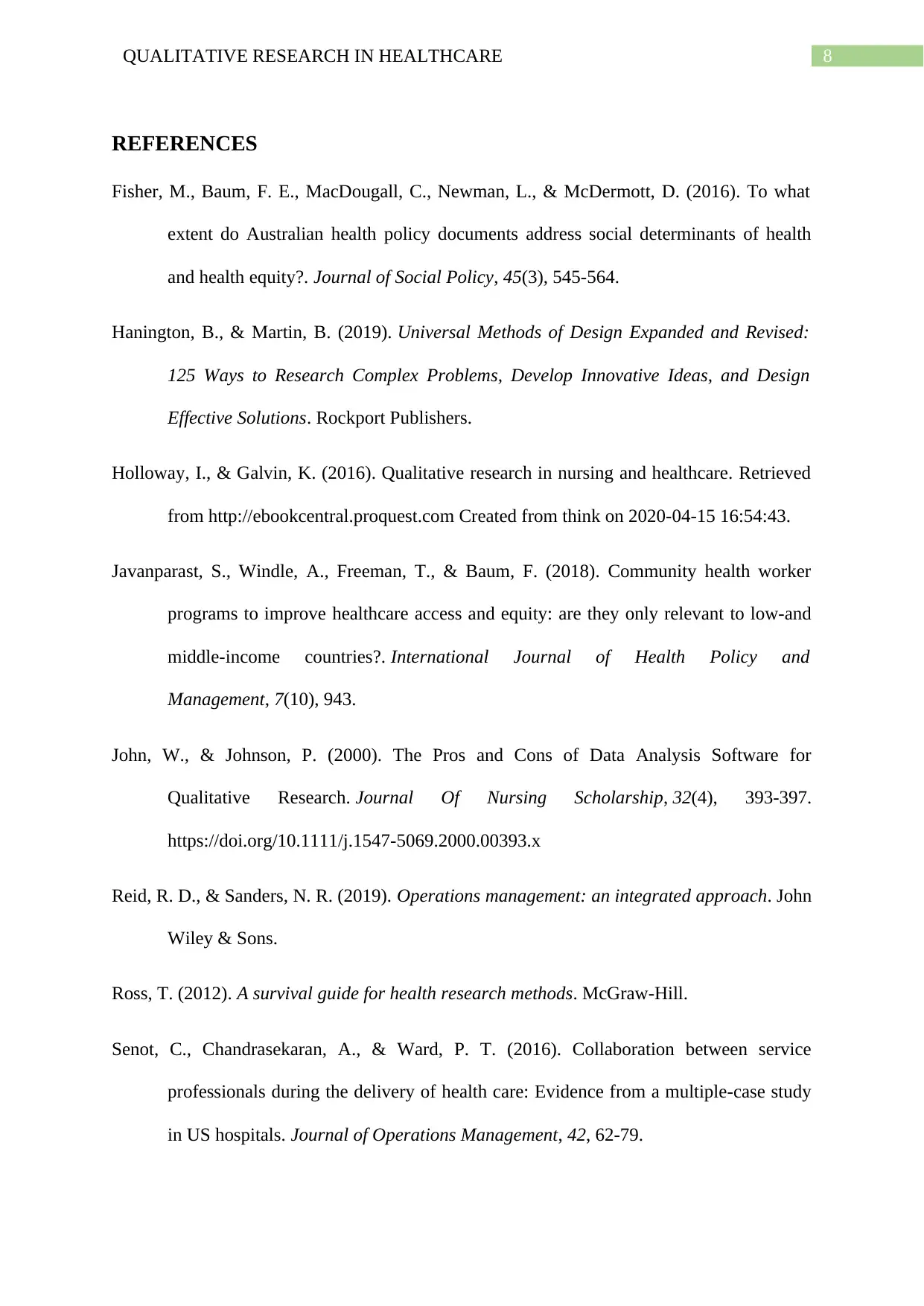
8QUALITATIVE RESEARCH IN HEALTHCARE
REFERENCES
Fisher, M., Baum, F. E., MacDougall, C., Newman, L., & McDermott, D. (2016). To what
extent do Australian health policy documents address social determinants of health
and health equity?. Journal of Social Policy, 45(3), 545-564.
Hanington, B., & Martin, B. (2019). Universal Methods of Design Expanded and Revised:
125 Ways to Research Complex Problems, Develop Innovative Ideas, and Design
Effective Solutions. Rockport Publishers.
Holloway, I., & Galvin, K. (2016). Qualitative research in nursing and healthcare. Retrieved
from http://ebookcentral.proquest.com Created from think on 2020-04-15 16:54:43.
Javanparast, S., Windle, A., Freeman, T., & Baum, F. (2018). Community health worker
programs to improve healthcare access and equity: are they only relevant to low-and
middle-income countries?. International Journal of Health Policy and
Management, 7(10), 943.
John, W., & Johnson, P. (2000). The Pros and Cons of Data Analysis Software for
Qualitative Research. Journal Of Nursing Scholarship, 32(4), 393-397.
https://doi.org/10.1111/j.1547-5069.2000.00393.x
Reid, R. D., & Sanders, N. R. (2019). Operations management: an integrated approach. John
Wiley & Sons.
Ross, T. (2012). A survival guide for health research methods. McGraw-Hill.
Senot, C., Chandrasekaran, A., & Ward, P. T. (2016). Collaboration between service
professionals during the delivery of health care: Evidence from a multiple-case study
in US hospitals. Journal of Operations Management, 42, 62-79.
REFERENCES
Fisher, M., Baum, F. E., MacDougall, C., Newman, L., & McDermott, D. (2016). To what
extent do Australian health policy documents address social determinants of health
and health equity?. Journal of Social Policy, 45(3), 545-564.
Hanington, B., & Martin, B. (2019). Universal Methods of Design Expanded and Revised:
125 Ways to Research Complex Problems, Develop Innovative Ideas, and Design
Effective Solutions. Rockport Publishers.
Holloway, I., & Galvin, K. (2016). Qualitative research in nursing and healthcare. Retrieved
from http://ebookcentral.proquest.com Created from think on 2020-04-15 16:54:43.
Javanparast, S., Windle, A., Freeman, T., & Baum, F. (2018). Community health worker
programs to improve healthcare access and equity: are they only relevant to low-and
middle-income countries?. International Journal of Health Policy and
Management, 7(10), 943.
John, W., & Johnson, P. (2000). The Pros and Cons of Data Analysis Software for
Qualitative Research. Journal Of Nursing Scholarship, 32(4), 393-397.
https://doi.org/10.1111/j.1547-5069.2000.00393.x
Reid, R. D., & Sanders, N. R. (2019). Operations management: an integrated approach. John
Wiley & Sons.
Ross, T. (2012). A survival guide for health research methods. McGraw-Hill.
Senot, C., Chandrasekaran, A., & Ward, P. T. (2016). Collaboration between service
professionals during the delivery of health care: Evidence from a multiple-case study
in US hospitals. Journal of Operations Management, 42, 62-79.
⊘ This is a preview!⊘
Do you want full access?
Subscribe today to unlock all pages.

Trusted by 1+ million students worldwide
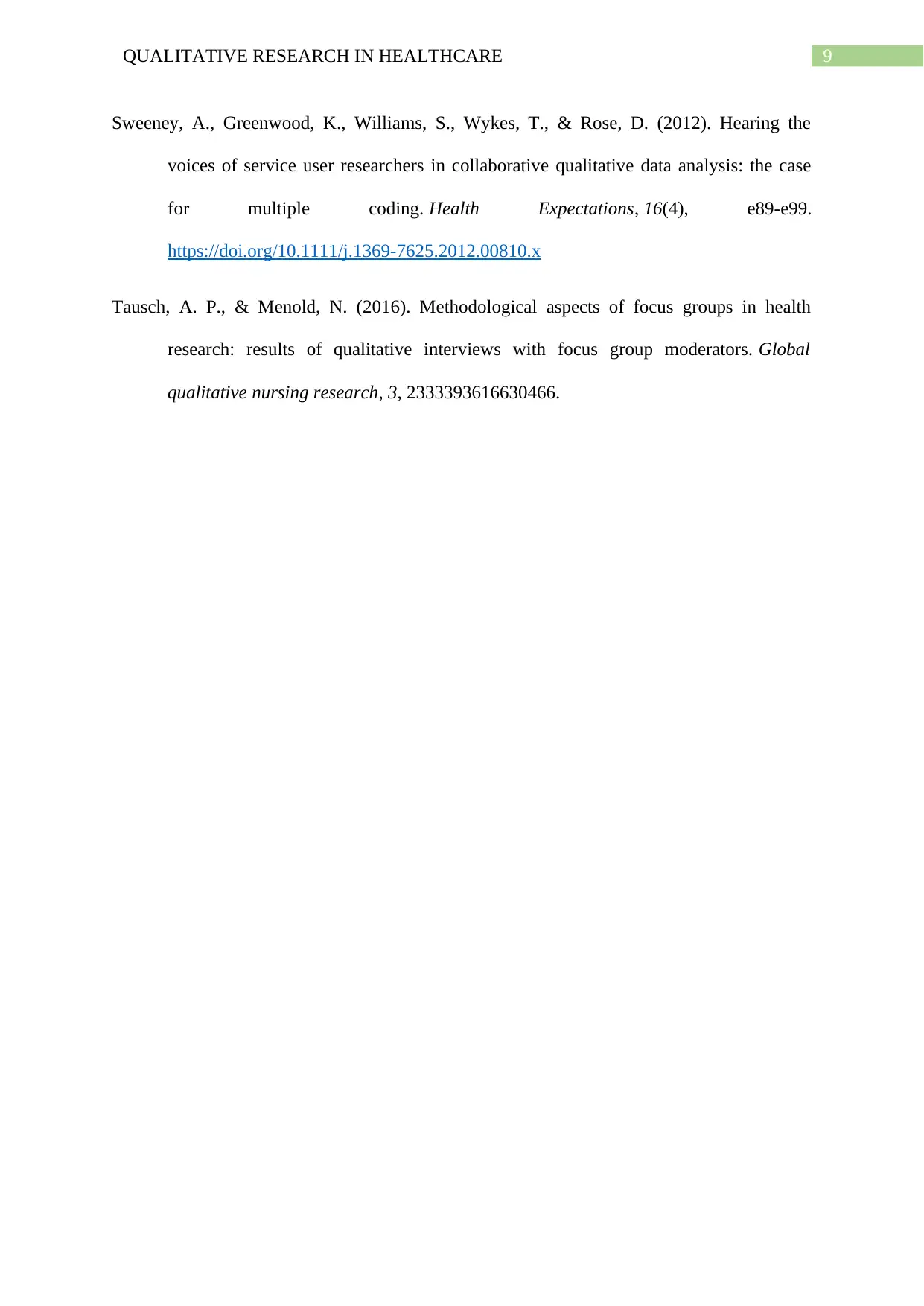
9QUALITATIVE RESEARCH IN HEALTHCARE
Sweeney, A., Greenwood, K., Williams, S., Wykes, T., & Rose, D. (2012). Hearing the
voices of service user researchers in collaborative qualitative data analysis: the case
for multiple coding. Health Expectations, 16(4), e89-e99.
https://doi.org/10.1111/j.1369-7625.2012.00810.x
Tausch, A. P., & Menold, N. (2016). Methodological aspects of focus groups in health
research: results of qualitative interviews with focus group moderators. Global
qualitative nursing research, 3, 2333393616630466.
Sweeney, A., Greenwood, K., Williams, S., Wykes, T., & Rose, D. (2012). Hearing the
voices of service user researchers in collaborative qualitative data analysis: the case
for multiple coding. Health Expectations, 16(4), e89-e99.
https://doi.org/10.1111/j.1369-7625.2012.00810.x
Tausch, A. P., & Menold, N. (2016). Methodological aspects of focus groups in health
research: results of qualitative interviews with focus group moderators. Global
qualitative nursing research, 3, 2333393616630466.
1 out of 10
Related Documents
Your All-in-One AI-Powered Toolkit for Academic Success.
+13062052269
info@desklib.com
Available 24*7 on WhatsApp / Email
![[object Object]](/_next/static/media/star-bottom.7253800d.svg)
Unlock your academic potential
Copyright © 2020–2026 A2Z Services. All Rights Reserved. Developed and managed by ZUCOL.





